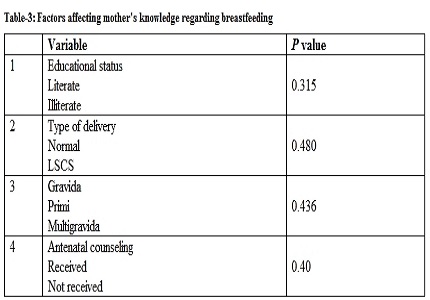Knowledge and practices of breastfeeding among rural postnatal mothers in Central India
Abstract
Background: Breastfeeding is known to be central in an infant’s nutrition and growth worldwide. However, breastfeeding rates have remained low during this crucial period due to various misconceptions and cultural beliefs. This study was planned to assess the knowledge and practices of breast feeding and identify misconceptions regarding breastfeeding in the postnatal mothers from rural central India.
Methodology: A cross-sectional observational questionnaire based study was conducted at a tertiary care teaching hospital in rural part of central India. A total of 100 postnatal mothers attending the pediatric out-patient department were enrolled in the study. Subjects were informed about the study, written consent taken and a structured questionnaire was administered to them.
Results: About one third (34%) of the mothers were either illiterate or received only primary education. Only 18 % mothers had received antenatal counseling about breast feeding and only 28% had their breast examination done. Although majority of the mothers (86%) were breastfeeding their babies, only 22 % had initiated breastfeeding within an hour of delivery. Only 70% mothers knew that exclusive breastfeeding should be given for first six months and only 58% believed that it should be continued till 2 years age. Only 18 % mothers knew about the correct technique of breastfeeding.
Conclusions: This study reveals that the knowledge and practices of postnatal mothers regarding breastfeeding are far from satisfactory. Our study emphasizes the need for education of mothers especially during antenatal visits and whenever the healthcare providers get an opportunity to sensitize them about the correct technique, early initiation and exclusiveness of breastfeeding for first 6 months.
Downloads
References
2. WHO. The WHO Global Data Bank on Infant and Young Child Feeding. WHO Nutrition for Health and Development, 2009. Available from:http://www.who.int. (Accessed on 21 September 2017).
3. Gupta A. BPNI: 10 years of its work.J Indian Med Assoc. 2002 Aug;100(8):512-5. [PubMed]
4. Rasania SK, Singh SK, Pathi S, Bhalla S,Sachdev TR. Breast-Feeding Practices In A Maternal And Child Health Centre In Delhi. Health Popul Perspect Issues. 2003; 26 (3):110-5.
5. National Family Health Survey-4; (2015-16). Available at http://rchiips.org/NFHS/pdf/NFHS4/AP_FactSheet.pdf.
6. Magawa R. Knowledge, attitudes and practices regarding exclusive breastfeeding in Southern Africa-Part 2. 2012. (Accessed on 2017 September 21). Available from:http://www.polity.org.za/article/knowledge-attitudes-and-practices-regarding-exclusive-breastfeeding-in-southern-africa---part-1-2012-12-05.
7. Mohammed E S, Ghazawy E R, Hassan E E. Knowledge, Attitude, and Practices of Breastfeeding and Weaning Among Mothers of Children up to 2 Years Old in a Rural Area in El-Minia Governorate, Egypt. J Family Med Prim Care. 2014 Apr-Jun; 3(2): 136–140. doi: 10.4103/2249-4863.137639.
8. Chaudhary RN, Shah T, Raja S. Knowledge and practice of mothers regarding breast feeding: A hospital based study. Knowl Pract Breast Feed. 2011; 9:194–200. doi: http://dx.doi.org/10.3126/hren.v9i3.5590.
9. Nabulsi M. Why are breastfeeding rates low in Lebanon? A qualitative study.BMC Pediatr. 2011 Aug 30;11:75. doi: 10.1186/1471-2431-11-75.
10. Tiwari S, Bharadva K, Yadav B, Malik S, Gangal P, Banapurmath CR, Zaka-Ur-Rab Z, Deshmukh U, Visheshkumar -, Agrawal RK. Infant and Young Child Feeding Guidelines, 2016.Indian Pediatr. 2016 Aug 8;53(8):703-13.
11. Agarwal S, Srivastava K, Sethi V. Maternal and New-born Care Practices Among the Urban Poor in Indore, India: Gaps,Reasons and Possible Program Options.Urban Health Resource Center, New Delhi, 2007.
12. Karnawat D, Karnawat BS, Joshi A, Kohli GK. Knowledge, attitude & practices about infant feeding among mothers of urban & rural areas of Ajmer district. JMR 2015; 1(3): 90-9.
13. Ulak M, Chandyo RK, Mellander L,Shrestha PS, Strand TA. Infant feeding practices in Bhaktapur, Nepal: a crosssectional,health facility based survey. Int Breastfeed J, 2012; 10:1. doi: https://doi.org/10.1186/1746-4358-7-1.
14. Pandey D, Sardana P, Saxena A, Dogra L, Coondoo A, Kamath A. Awareness and Attitude towards Breastfeeding among Two Generations of Indian Women: A Comparative Study.PLoS One.2015 May 19;10(5):e0126575. doi: 10.1371/journal.pone.0126575. eCollection 2015.
15. World Health Organization. Infant and young child feeding Model Chapter for textbooks for medical students and allied health professionals. World Health Organization. 2009.

Copyright (c) 2017 Author (s). Published by Siddharth Health Research and Social Welfare Society

This work is licensed under a Creative Commons Attribution 4.0 International License.


 OAI - Open Archives Initiative
OAI - Open Archives Initiative


